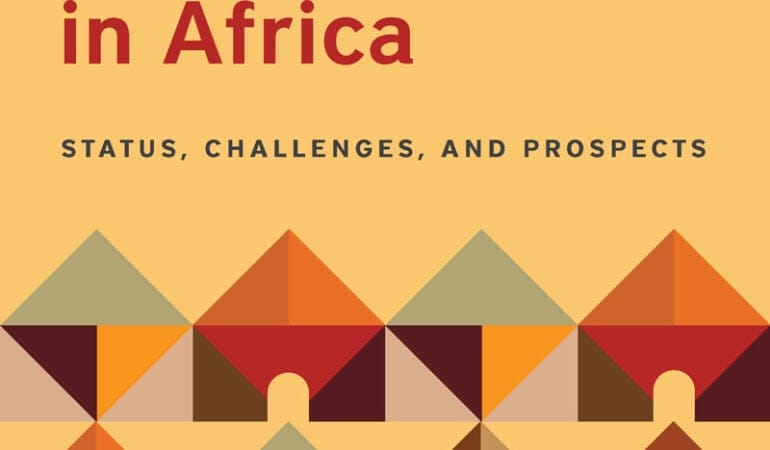
New Lincoln Institute Book
Property Tax in Africa: Status, Challenges, and Prospects
By Riël Franzsen and William McCluskey
Africa’s rapid growth and urbanization will require stable local governments to deliver goods and services to billions of people. Authors Riël Franzsen and William McCluskey suggest that the property tax can help communities in Africa manage this challenge.
In Property Tax in Africa: Status, Challenges, and Prospects, Franzsen and McCluskey of the African Tax Institute at the University of Pretoria provide the first comprehensive study of the property tax on the continent, laying out challenges, opportunities, and pathways to improvement. They analyze property tax systems in 29 countries and offer four regional overviews, highlighting the key political, administrative, and technical issues that affect how these systems function.
The book comes at a critical time for Africa. The world’s fastest growing continent, Africa has added more than 500 million people since 1990, and by 2050 it will hold a quarter of the world’s population. The continent is rapidly urbanizing and, together with Asia, will absorb most of the world’s urban growth in the coming decades.
“Nowhere are the fiscal challenges of urbanization more pronounced than in Africa,” Lincoln Institute President and CEO George W. “Mac” McCarthy writes in the book’s foreword. “It will require a lot of work to establish high-functioning systems capable of delivering reliable annual revenue flows to help cities make ends meet. But there is plenty of room for optimism.”
Some African cities generate significant revenues from the property tax, despite the relatively low utilization of the tax in most African countries: 42 percent of all locally generated revenue in Freetown, Sierra Leone; 23 percent in Nairobi, Kenya; and 21 percent in Accra, Ghana, for example. On average in Africa, however, the property tax represents only 0.38 percent of gross domestic product, compared to more than 2 percent in the mostly developed countries that make up the Organisation for Economic Co-operation and Development (OECD).
Property Tax in Africa identifies many common challenges, including poor tax collection and enforcement, weak administration, and inadequate systems for systematically assessing property values.
The book also highlights some successes in cities that have been able to bolster their property tax systems. The city of Kitwe, Zambia, undertakes supplementary valuations, which have increased the number of properties on the tax rolls and increased assessed values, leading to greater revenue. In Kampala, Uganda, officials from the national Uganda Revenue Authority and the Ministry of Finance collaborated with the local government to set up a new office for revenue collection, which more than doubled the collection of property tax in four years.
A resource for property tax scholars as well as public officials and practitioners, the book makes recommendations for improving the performance of the property tax in Africa, including the following:
- Thoroughly analyze the property tax system and decide how it relates to national economic development goals.
- Audit the legal underpinnings of the property tax and redraft laws, as needed, to lay the groundwork for more effective systems.
- In most countries, concentrate reform in the largest cities.
- Focus on collection and enforcement systems first.
- Plan gradual transitions that allow the tax administration to catch up and taxpayers to adapt to the new system.
In addition to continent-wide and regional overviews, the book includes detailed analyses of the 29 countries: Benin, Botswana, Cabo Verde, Cameroon, Central African Republic, Cote d’Ivoire, Democratic Republic of the Congo, Egypt, Equatorial Guinea, Gabon, The Gambia, Ghana, Kenya, Liberia, Madagascar, Mauritius, Morocco, Mozambique, Namibia, Niger, Rwanda, Senegal, Sierra Leone, South Africa, Sudan, Tanzania, Uganda, Zambia, and Zimbabwe.
About the Authors
Riël Franzsen occupies the South African Research Chair in Tax Policy and Governance and is also director of the African Tax Institute at the University of Pretoria, South Africa.
Dr. William McCluskey joined the University of Ulster in 1986. He was appointed as Professor of Property Studies at Lincoln University, Christchurch, New Zealand from 2001–2002. He is currently Extraordinary Professor at the African Tax Institute, University of Pretoria, South Africa.
Contents
PART I Current Status and Challenges
1 Introduction
Riël Franzsen and William McCluskey
2 Policy and Practice
William McCluskey, Riël Franzsen, and Roy Bahl
PART II Country Reviews
3 Benin
Bernard Tayoh and William McCluskey
4 Botswana
William McCluskey, Riël Franzsen, and Mundia Kabinga
5 Cabo Verde
Riël Franzsen, William McCluskey, and Vasco Nhabinde
6 Cameroon
Bernard Tayoh
7 Central African Republic
Bernard Tayoh and Riël Franzsen
8 Côte D’ivoire
Bernard Tayoh
9 Democratic Republic of the Congo
Jean-Jacques Nzewanga and Riël Franzsen
10 Egypt
Khaled Amin, William McCluskey, and Riël Franzsen
11 Equatorial Guinea
Bernard Tayoh and Riël Franzsen
12 Gabon
Nara Monkam
13 The Gambia
William McCluskey and Samuel Jibao
14 Ghana
Samuel Jibao
15 Kenya
William McCluskey, Riël Franzsen, and Washington Olima
16 Liberia
Riël Franzsen and Samuel Jibao
17 Madagascar
Jean-Jacques Nzewanga, Riël Franzsen, and William McCluskey
18 Mauritius
Riël Franzsen and William McCluskey
19 Morocco
Riël Franzsen and Maria Elkhdari
20 Mozambique
William McCluskey and Vasco Nhabinde
21 Namibia
Riël Franzsen and William McCluskey
22 Niger
Boubacar Hassane, Riël Franzsen, and William McCluskey
23 Rwanda
William McCluskey and Jean-Jacques Nzewanga
24 Senegal
Nara Monkam
25 Sierra Leone
Samuel Jibao
26 South Africa
Riël Franzsen
27 Sudan
Shahenaz Hassan and Riël Franzsen
28 Tanzania
William McCluskey and Riël Franzsen
29 Uganda
Riël Franzsen and William McCluskey
30 Zambia
Riël Franzsen, Mundia Kabinga, and Chabala Kasese
31 Zimbabwe
John Chakasikwa, Riël Franzsen, and William McCluskey
PART III African Countries by Region
32 Anglophone Africa
Riël Franzsen and William McCluskey
33 Francophone Africa
Riël Franzsen and William McCluskey
34 Lusophone Africa
William McCluskey, Riël Franzsen, and Vasco Nhabinde
35 North and Northeast Africa
Riël Franzsen and William McCluskey
PART IV The Future of the Property Tax in Africa
36 Challenges, Prospects, and Recommendations
William McCluskey, Riël Franzsen, and Roy Bahl
